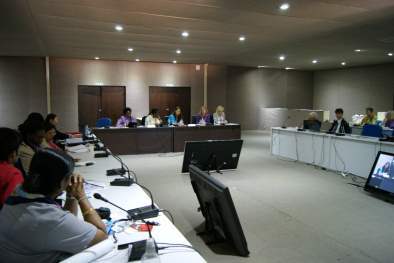The following issues were raised by the panel and the audience:
- Women are key actors in water resources management
- Gender must be mainstreamed in water resources management, it is empowering to women
- At the same time, women’s empowerment improves water management
- There must be strong partnering across sectors on gender. We are stronger when we work together and build on each other’s strength.
- Promotion of gender sensitive water management benefits both women and men
- Political will is needed to make sure that women’s participation in decision-making and leadership is recognized
- Effective professional networking with partners at all levels who have expertise on gender
- The existence of minimum shared indicators and that even though countries can adopt more indicators, we need to synthesize key indicators, and there needs to be minimum shared indicators for benchmarking purposes
- The importance of gender disaggregated data
- Women and girls must be empowered with information and skills
- Climate change is making the risks worse, either “there is too much water, too little or too dirty water”
The panel concluded that “We can’t have sustainable development without gender equality”. The voice of women must continue to be heard in the negotiations to make sure that gender and water are incorporated.
The Side Event was organized by the Global Water Partnership together with the African Ministers’ Council on Water (AMCOW); GWP; UNDP; International Network for Capacity Building in Sustainable Water Management (Cap-Net); South Asia Consortium for Interdisciplinary Water Resources Studies; SaciWATERs; Public Health Institute (PHI); Center for Public Health and Climate Change; the Gender and Water Alliance (GWA); and Women Rights.
Speakers included: Hon Rejoice Mabudafhasi, Deputy Minister of Water and Environmental Affairs, South Africa and Chair of the Network of Women Ministers and Leaders for the Environment. Annika Markovic - Environment Ambassador, Ministry of the Environment and Ministry of Foreign Affairs, Sweden. Mercy Dikito-Wachtmeister, Senior Officer Global Initiatives GWP. Bettina Menne, WHO Regional Office for Europ. Janet Kabeberi-Macharia Senior Gender Advisor, UNEP. Eiman Karar, Director Water Resources management, Water Research Commission, South Africa. Daniela Nogueira/ and Ninon Machado, Gender Water Alliance, Brazil, Ann Marie Sloth Carlsen, Senior Advisor on Environment and Sustainabale Development.

